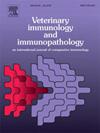沙门氏菌疫苗在家禽中的应用进展:小型综述。
IF 1.4
3区 农林科学
Q4 IMMUNOLOGY
引用次数: 0
摘要
沙门氏菌是一类重要的人畜共患病原体,在家禽中广泛传播,导致禽沙门氏菌病。这种疾病通常会导致家禽性能显著下降,包括蛋鸡产蛋量下降、雏鸡孵化率下降和肉鸡生长迟缓。因此,全球家禽业遭受了严重的经济损失。接种疫苗是预防家禽感染沙门氏菌的重要策略,可有效降低易感性,减轻疾病症状,同时最大限度地减少粪便脱落和环境污染。从而降低公共卫生风险。各种沙门氏菌疫苗可诱导不同程度的体液和细胞免疫反应。因此,透彻了解免疫防御机制,尤其是家禽感染沙门氏菌后的适应性免疫反应,对于开发沙门氏菌疫苗至关重要。本综述总结了沙门氏菌疫苗在家禽中的应用进展,包括沙门氏菌诱导的适应性免疫反应和针对家禽中主要流行血清型的疫苗。本综述还对禽源沙门氏菌疫苗的未来发展进行了展望。本文章由计算机程序翻译,如有差异,请以英文原文为准。
Progress in the application of Salmonella vaccines in poultry: A mini review
Salmonella is a critical group of zoonotic pathogens that are widely spread in poultry, causing avian salmonellosis. This disease usually leads to significant reductions in poultry performance, including reduced egg production in laying hens, decreased hatchability in chicks, and retarded growth in broilers. As a result, worldwide poultry industry suffers serious economic losses. Vaccination serves as an essential strategy for preventing Salmonella infection in poultry, effectively reducing susceptibility and alleviating disease symptoms, while also minimizing fecal shedding and environmental contamination. This subsequently diminishes public health risks. Various Salmonella vaccines can induce humoral and cellular immune responses to different extents. Therefore, a thorough understanding of the immune defense mechanisms, especially adaptive immune responses in poultry infected with Salmonella, is crucial for the development of Salmonella vaccines. This review summarizes the progress in the application of Salmonella vaccines in poultry, including adaptive immune responses induced by Salmonella and vaccines targeting the predominant circulating serotypes in poultry. It also provides an insight into the future of poultry-origin Salmonella vaccines.
求助全文
通过发布文献求助,成功后即可免费获取论文全文。
去求助
来源期刊
CiteScore
3.40
自引率
5.60%
发文量
79
审稿时长
70 days
期刊介绍:
The journal reports basic, comparative and clinical immunology as they pertain to the animal species designated here: livestock, poultry, and fish species that are major food animals and companion animals such as cats, dogs, horses and camels, and wildlife species that act as reservoirs for food, companion or human infectious diseases, or as models for human disease.
Rodent models of infectious diseases that are of importance in the animal species indicated above,when the disease requires a level of containment that is not readily available for larger animal experimentation (ABSL3), will be considered. Papers on rabbits, lizards, guinea pigs, badgers, armadillos, elephants, antelope, and buffalo will be reviewed if the research advances our fundamental understanding of immunology, or if they act as a reservoir of infectious disease for the primary animal species designated above, or for humans. Manuscripts employing other species will be reviewed if justified as fitting into the categories above.
The following topics are appropriate: biology of cells and mechanisms of the immune system, immunochemistry, immunodeficiencies, immunodiagnosis, immunogenetics, immunopathology, immunology of infectious disease and tumors, immunoprophylaxis including vaccine development and delivery, immunological aspects of pregnancy including passive immunity, autoimmuity, neuroimmunology, and transplanatation immunology. Manuscripts that describe new genes and development of tools such as monoclonal antibodies are also of interest when part of a larger biological study. Studies employing extracts or constituents (plant extracts, feed additives or microbiome) must be sufficiently defined to be reproduced in other laboratories and also provide evidence for possible mechanisms and not simply show an effect on the immune system.

 求助内容:
求助内容: 应助结果提醒方式:
应助结果提醒方式:


